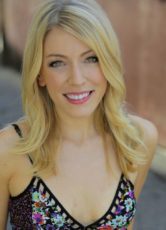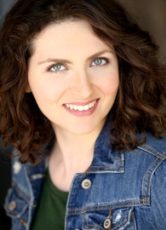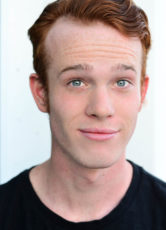
With a quarter of a century in show business and hundreds of interviews under her belt, Ilana Levine took her career to the next level by starting her podcast, Little Known Facts.
Little Known Facts shares an endless amount of answers and behind-the-scenes stories that bring not only entertaining viewpoints but hacks to being an actor in today’s world.
Your podcast, Little Known Facts, really digs into the lives of the actors you interview. How do you choose who you are going to interview and do you review the questions in advance with them?
I choose artists who are not only extraordinary talents but artists who are also incredibly generous humans. I do not share questions in advance but I do let them know to expect a free-flowing conversation that will be joyous and surprising.
What are your short-term and long-term goals with Little Known Facts?
My goal was to share intimate and honest (and funny) conversations with extraordinary actors and to find a way to reach as many young actors so that they will have the benefit of learning from my guest’s experiences as they go out and begin their own careers. My hope is that each conversation will remind them that everyone faces the same struggles and triumphs no matter where they are in their journey, inspire them to pursue their own dreams and offer up real life experience and advice given to them by the most successful artists working today.
There are so many behind-the-scenes things that happen, that the general public is not privy to. What are the most memorable BTS stories that you were told?
I think it’s constantly surprising how many of the most successful people I know still feel so vulnerable and uncertain every time they start a new project.
[For example,] the idea that Cynthia Nixon can battle with stage fright after a career in the theater that spans four decades or the number of people who were on the verge of giving up and then the next job moved them to the next level.
One specific takeaway from Julianne Moore is that right before a take in a film she loves to talk to the other actors in the scene as Julianne and does not enter the world of the character until the director calls “action.” For her, that allows the transition from Julianne to the character to feel much more seamless.
But I always come back to my conversation with Judith Light who learned early on that if she judged her self-worth based on having an acting job and only based on that she would miss out on all the other areas of growth and happiness in her life. Early on she devoted her life to causes and organizations that she cared deeply about. To her that meant she always felt like her life had purpose in every context not just in the context of her career.
You’ve been in show business for 25+ years, having been on Broadway and screen. What’s the difference between acting on screen vs. on stage? Which is your preference?
Any chance to act can feel like a gift even after all these years. But having done a lot of stage and screen work at this point, I would say that I love both equally but they are such different experiences. Not so much from the standpoint of how I approach the work but what is going on around me while I am doing the work.
In theater you have the benefit of rehearsal and telling the story in the order that your character experiences it so you do not have to track where you are in relation to the piece – you are living it as it happens.
With film or TV generally, you shoot out of sequence, there is very little rehearsal and there are huge numbers of people doing their jobs as you do yours and that takes a completely different kind of concentration. Obviously at the end of the day when you are in a play, you have full ownership of what the audience sees. In a filmed project the editor and director curate your performance based on their vision and so you have very little control of what the final product is.
You grew up in Teaneck, NJ, and currently live in Brooklyn, NY with your husband, two kids, and dog. You originally became interested in acting when you were getting your hair styled in Teaneck and saw a script lying on the counter. Was that your “a-ha” moment that geared you toward acting?
I don’t know that I had an “a-ha” moment that I was going to be a professional actor but when I was invited to audit an acting class with the hairstylist, who had a script in the salon where I was getting a haircut, I walked into a room where people were sharing such deep parts of themselves and receiving so much support from the other students in the room and I knew right away I wanted to be in the company of generous, sensitive and deeply thoughtful people.
It was all so new to me. I had not grown up doing plays but I did grow up going to see a lot of Broadway shows because my mother loved Broadway and took us to celebrate every milestone in our lives. But after I went to that acting class I decided I wanted to study theater arts in college. From there I met so many people who are still my friends today.
Right out of school, I did a non-union play in NYC and an assistant agent came to see it and it turns out he was my first summer camp crush when I was 12 years old. He started working with me (unofficially) and submitted me for an HBO series soon after and I got that job. Then suddenly I was a “professional” actress. Another actress in that series was Cynthia Nixon and we became fast friends and she really took me under her wing.
Your husband is also an actor. Do you have any fear of not being able to pay your bills? Is it difficult to be in the entertainment field with two children?
All actors are always afraid that the job they have now may be their last. So of course, we always worry about the future but to be honest we waited to have children until we felt that we were both secure in our careers and could afford to take care of them and work in this industry. That being said, our kids know the ups and downs of a career in the arts and both love the people and experiences they get to have because of it. However, I am sure they also wonder what it would be like to have parents who worked more of a 9-5 job.
You’re known to musical theater fans as “Lucy Van Pelt” from the Broadway revival of You’re A Good Man Charlie Brown. You also starred in the Broadway productions of Jake’s Women, Wrong Mountain, and The Last Night Of Ballyhoo. What was your mindset when the shows came to an end?
Nothing is sadder than a show you love coming to an end. You are not only saying goodbye to the show but to the family that has been created around the show. I have been in shows that closed too soon and that is a whole other kind of heartbreak because not only is it so sad to not get to learn what the show fully is – you also feel devastated for the playwright who spent years writing the piece and you want for them to get to see it be everything they hoped it would be.
With Charlie Brown, well, that was a really hard one to say goodbye to. We actually got to do it for a long time because we were out of town with it for a few months before it came to Broadway. We all loved each other so much and loved doing that show every night and having the audience leave the theater so filled with love, hope, and happiness – that was the most joyous experience I have ever had on stage.
With Covid-19 shutting Broadway down for over a year, what’s being done to reopen theaters while keeping people safe?
I know that producers and theater owners have been working hard to make sure that the buildings are going to reopen with the kind of ventilation system and protocols that will keep the employees of the show and the attendees as safe as possible. As more and more people are vaccinated more and more theater will begin to happen in venues large and small.
Why is it that humor and comedy make people feel more comfortable?
I think we all need the release that laughter brings. We all are filled with things that make us anxious, scared and uncertain but I have always found that the ability to find humor and a reason to laugh even in the face of really hard things can help us get through. I also believe it’s just as important to allow ourselves to have really dark feelings and be vulnerable and not put on a fake front in order to make other people comfortable. We have to have room to be our full selves but personally I love funny people and I love making others laugh. It is very satisfying.
What advice do you have for people who want to get into acting?
On my podcast, Edie Falco talks about how she never expected to make a living as an actor. She just wanted to act and was willing to do any kind of job to pay her bills as long as she found opportunities to do the thing she loved and to this day she is floored that life turned out the way it did for her.
So many of the actors on my show felt that way. They just wanted to create stuff. So my advice is always the same – just do the thing – make the thing you love. Don’t expect anything to happen beyond the doing of it but I believe if you make something because every bone in your body needs to, every fiber of your being believes in it, then others will want to see what you are doing and be a part of it and be inspired by it and that is the reason for being an artist.
Want to get your acting career started? Sign up or login to Casting Frontier and start auditioning today!
Related articles:
Acting Coach Terry Knickerbocker on How Consistency Wins
Interview with Television Casting Directors
Actor Spotlight Parker Queenan: Booking a Role Requires Patience
Written by Ilana Rapp
Ilana Rapp is a media-savvy Generation Xer with instinctive wit, quick humor and a taste for deep human emotions. As a former (child) actress with Broadway, film and television credits, she is adept at, well, lots of things. She blogged on The Huffington Post and writes entertainment pieces for Casting Networks, Casting Frontier, NYCastings, Mupo Entertainment and New Jersey Stage. She is a huge fan of the television show V. Ask her why her favorite number is 22. Follow Ilana on Twitter @IlanaSpeaks22




